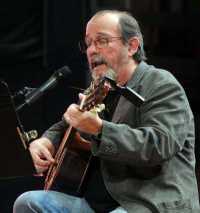Silvio Rodríguez Domínguez (born November 29, 1946 in San Antonio de los Baños) is a Cuban musician, and a leader of the nueva trova movement.
He is considered Cuba's best known folk singer and known for his highly eloquent and symbolic lyrics. Many of his songs have become classics in Latin American music, such as Ojalá, Playa Girón, Unicornio and La maza. He has released nearly 20 albums.
Rodríguez, musically and politically, is a symbol of the Latin American left wing. His lyrics are notably introspective. His songs combine romanticism, love (even eroticism), revolutionary politics, and idealism.
Rodríguez was born on November 29, 1946 in San Antonio de los Baños, a fertile valley in Havana Province known for its tobacco crop. He was raised in a family of poor farmers. His father, Víctor Dagoberto Rodríguez Ortega, was a farmer and amateur poet who supported socialist causes. His mother, Argelia Domínguez León, was a house wife. On many occasions Rodríguez has spoken how his love of music was developed by his mother, who would pass time singing boleros and songs from Santiago. Although Rodríguez had an uncle who played the bass, his mother had a far greater influence. Later, she also collaborated with him on a few musical works.
When the Revolution led by Fidel Castro triumphed in January 1959, Rodríguez was only 13 years old, and, like most Cubans of his generation, became involved in the new Revolutionary enthusiasm. He participated in the Literacy Campaign held in 1961, and then started working as a comics designer in a magazine. During this period a friend of his, Lázaro Fundora, taught him how to play the guitar.
In 1969, for almost five months, he worked as part of the crew on the fishing boat Playa Girón, and during this fertile episode he wrote 62 songs, among which are the famous "Ojalá" and "Playa Girón." The lyrics and music of these songs became a book named Canciones del Mar. In 1976, he decided to join Cuban troops in Angola, playing for the soldiers.
After more than 40 years of artistic work, Rodríguez has now written a vast number of songs and poems (said to be between 500 and more than one thousand), many of which have never been set to music and probably never will be. Although his musical knowledge has been continuously increasing (counting among his teachers the famous Cuban composer Leo Brouwer), he is more widely praised for the poetry in his songs than for the accompanying music. His lyrics are a staple of leftist culture throughout the whole Spanish-speaking world, and he has been banned from the media during several of the dictatorial regimes that ruled Latin America in the late 1970s and early 1980s.
The entire work of Silvio Rodriguez offers an intimate and introspective window into the life cycle of the artist. If the lyrics of the early part of his career are about revolutionary enthusiasm, love encounters and disappointments, as well as sensual desire, and if the middle-aged Silvio is more self-questioning, often looking backward; his most recent albums, such as Cita Con Angeles, talk in part about his life as a grandfather and has a certain focus on children, while Erase Que Se Era is the release (with all the means that come with being an established artist) of songs written early in his youth but never previously recorded. Mariposas also featured two classics composed in his youth.
Silvio Rodriguez stands out in the Spanish-speaking world for the intimacy and subtlety of his lyrics, as well as for his acoustic melodies and "chord picking." He is particularly popular amongst intellectual circles of the left in Latin America and Spain. He has also often served as Cuban cultural emissary in events of solidarity, whether in Chile (Silvio Rodriguez in Chile, 1991) or Argentina (En Vivo en Argentina, recorded in 1984), both massive concerts given shortly after the fall of the right-wing dictatorships. Cuban flags are always conspicuous in the crowd during his concerts.
In 2007, he received a doctorate honoris causa from Universidad Nacional Mayor de San Marcos in Peru.(Lima, Peru).
Rodriguez has been a major influence on many folk artists, including the Swedish artist José González.
